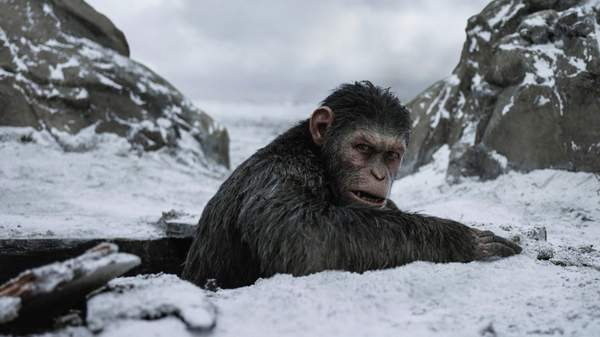Overview
As difficult as is it to name more than a handful of sequels that improve upon their predecessor, it's almost impossible to name a trilogy that gets progressively better from the first film to the third. After much contemplation, only two contenders spring to mind: Richard Linklater's Before trilogy, and Disney Pixar's Toy Story – each of which began from an incredibly strong position and yet somehow built upon and enriched each subsequent experience rather than draw out, repeat or simply ruin that which came before.
Now, however, we can add a third series to the list. Beginning in 2011 with Rise of the Planet of the Apes and followed up by Dawn of the Planet of the Apes three years later, this remarkable and consistently surprising franchise has saved its best entry until last with the thoughtful and deeply moving third installment: War for the Planet of the Apes.
And it is a war film, although not in the conventional sense. With soldiers' helmets emblazoned with slogans like 'Bye Bye Bonzo' and 'Monkey Killer', there's a definite Full Metal Jacket vibe among the human characters. Yet this is a war film more in the vein of Terrence Malick's The Thin Red Line. Emphasising visuals over dialogue and backed by a sumptuous orchestral score, the movie largely eschews combat sequences in favour of exploring internal conflicts, as well as the absurdity of observing 'rules' to govern the means by which two peoples might slaughter one another. It is at once a summer blockbuster and a poignant tragedy, which is no mean feat given it involves machine-gun wielding apes that can talk and ride on horseback.
There's not a moment in this film, from the opening frame to the last, where you question what you're seeing. The very name for what makes that possible, 'special effects', seems entirely insufficient to capture the extraordinary wizardry at play here. Pile all the transforming robots and world-destroying aliens together and you'll still get nothing as remotely impressive as what writer-director Matt Reeves and his team have delivered with this film. "My god, your eyes, they're almost human" exclaims Woody Harrelson's antagonist. Whatever flaw he sees, the audience cannot. These apes aren't simply special effects; they're characters, as real and as complex as any human standing opposite or beside them on screen.
This brings us to Andy 'Who Needs A Face To Act?' Serkis. Truly, the man could play a dilapidated gate on an abandoned farm and still imbue it with more pathos than most of his contemporaries. To say he's overdue for an Oscar is an entirely overplayed record, but until it happens or he stops turning in performances of such astounding nuance and tenderness, we'll keep on resetting the needle. Alongside his fellow motion-cap actors Terry Notary, Karen Konoval and Michael Adamthwaite, Serkis's Caesar is the heart of the film. He's the reluctant general; a gentle soul whose only reason for fighting is to save his fellow apes and family from extinction. Like Pacino's Michael Corleone in Godfather Part III, Caesar's efforts to secure peace instead find him drawn further into darkness, imperilling those he loves and condemning his own soul to ruin.
On the human front, each film in the Apes trilogy has featured fewer than the one before it, and in War there are only two of note: Harrelson's ruthless Colonel and an orphaned girl named Nova played by the captivating Amiah Miller. They are, in many ways, the best and the worst of us – tormentors and saviours whose interactions with Caesar shape his every decision throughout the film. We are unquestionably compelled to side with the apes in this, the final stage of the trilogy, which is an intriguing sensation given we're barracking for the very creatures responsible for wiping us out. Again, it's down to the remarkable work of the team behind the film, whose storytelling and performances have given us a Shakespearean tale full of heartache, betrayal, courage and redemption. War for the Planet of the Apes is an instant classic and a fine conclusion to a spectacular saga.
